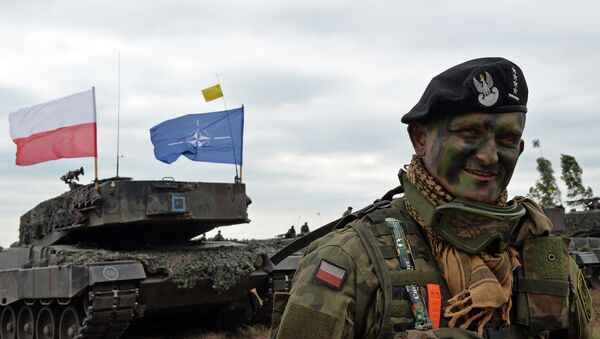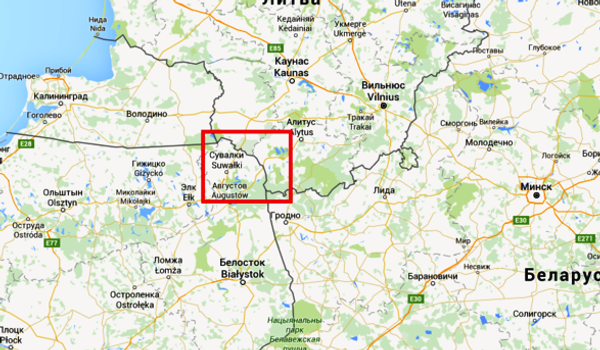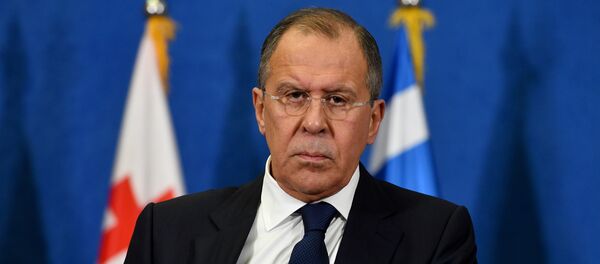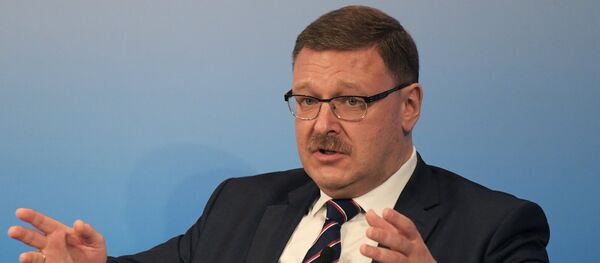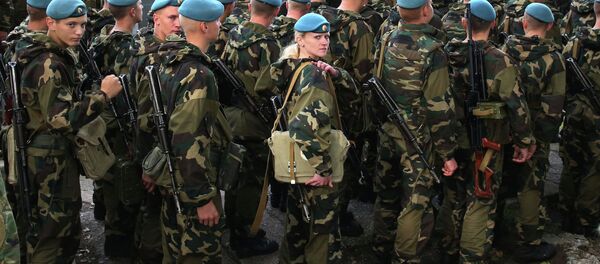The reason behind the NATO hysteria is that the drills are set to take place not far from the so-called "Suwalki Corridor" or "Suwalki Gap", which NATO and the Pentagon consider "the most vulnerable spot" of the Alliance and which they think Russia will seize first in its war with the block.
The Suwalki Gap, or SK Gap in American military parlance, named after nearby Polish town of Suwałki, is a 64 mile (102 km) land corridor between Poland and Lithuania, which is also wedged between Russian ally Belarus and the Russian exclave of Kaliningrad. This particular fact has turned this stretch of land into a core concern of all the NATO member states.
The NATO commanders consider that "should Vladimir Putin decide to invade, the corridor would be perfect for advancing Russian tanks" in a scenario where Russia approaches both from Kaliningrad and Belarus, seizing the corridor and completely cutting off the Baltic States.
"Military officers worry that in the event of a conflict with Moscow, the Russian military could use its forces in Kaliningrad, home to numerous military bases and bristling with advanced missiles, to effectively cut off the Suwalki Gap and sever the Baltic states from the rest of the alliance, they said," The Wall Street Journal reported on the issue.
"Russia could take over the Baltic states faster than we would be able to defend them," the commander of US ground forces in Europe, General Ben Hodges, admitted earlier in the year.
"It would not be necessary for Russian forces to comprehensively occupy the Sulwalki Gap area. Rather, even a thin and discontinuous line of Russian forces strung out along the Gap would present a barrier to the land reinforcement of the Baltics, unless NATO forces were prepared to force a passage and escalate the crisis," other US media speculated on the issue.
Commenting on the joint Russia-Belarus military drills, called West 2017, which are scheduled for September 14-20, Lithuanian President Dalia Grybauskaite added fuel to the fire by stating the exercise "demonstrates the preparation of Belarus and Russia to wage war with the West."
Even Ukraine which has no apparent relation to the territory, has recently tried to capitalize on the issue. The country's Secretary of the National Security and Defense Council Oleksandr Turchynov recently said that "the objective of the Russian military exercise is to check the readiness of troops to conduct large-scale operations with strict time restrictions on their preparation. During the exercises, Russia is also planning to work out a plan to create a corridor to Kaliningrad, which in reality is impossible without engaging Lithuania and Poland militarily."
In his analytical article for online newspaper Vzglyad, Russian political analyst Yevgeny Krutikov explains why all these fears are "openly stupid."
The "West" (Zapad) military drills, he notes, are held on a regular basis, once every two years in rotation on both territories of the Union State of Russia and Belarus.
"There is nothing extraordinary about them but each time some western neighbor gets demonstratively scared," he writes, adding that last time it was Poland which "had an episode," now it's Lithuania's turn.
For the first time in history, he says, Belarus has invited NATO observers to monitor the drills, which has caused a certain "voyeuristic thrill."
Mainstream media interpreted it as an attempt by the Belorussian president Lukashenko to "make assurances" against "Russian invasion."
Commenting on the Suwalki Gap area, the political analyst says that the vast majority of the terrain consists of wild woods, lakes and swamps. It is the most deserted area of Poland with undeveloped infrastructure and neglected Polish-Lithuanian settlements. The Wigry Polish National Park is also located in the area and is often shown on the English language National Geographic, which contains bison, wild boars and deer.
There are no roads, especially direct routes from Belarus to Kaliningrad.
"It does not even cross anyone's mind that tanks can’t pass through the Suwalki woods. It is easier, faster and more reliable to take Warsaw if we think in terms of fronts and armies, as they do in the Pentagon in the 21st century. Or we could drive our Armata from the Belorussian territory through the Lithuanian checkpoint of Medininkai further to the capital Vilnius, central Lithuanian city of Kaišiadorys, then Kaunas and up to Marijampolė on the border with Russia’s Kaliningrad oblast. This route will be a lot more preferable, without any need to cross the Neman river," Krutikov suggests.
The current mindset in NATO and the Pentagon is pitiful, he suggests.
Russia’s Defense Ministry has invited and will continue to invite reporters to cover Russian military drills, so the country has no need for outside advice, Russian Defense Ministry’s Spokesman Major General Igor Konashenkov responded on Saturday.
"It is highly improbable to find either a motivated journalist or a media outlet in Russia that the Defense Ministry has not invited to cover its military exercises over the last five years," Konashenkov said in a comment.
"General Hodges has never dreamt of the level of transparency that the media has been given to cover military operations of the Russian air force and navy in Syria. Otherwise, major US channels would not have broadcast ‘by mistake’ the Russian Defense Ministry’s video footage taken in Syria as illustrations of the US Air Force’s war on terror in the Middle East."
Since the Russian Aerospace Force started carrying out strikes in Syria, the Defense Ministry has organized more than ten press tours for foreign journalists, when they were able to communicate with local civilians and servicemen.
"Instead of urging us to be transparent, General Hodges should recall whether Russian journalists have ever been invited to cover the US Army’s exercises in Europe," he concluded.

